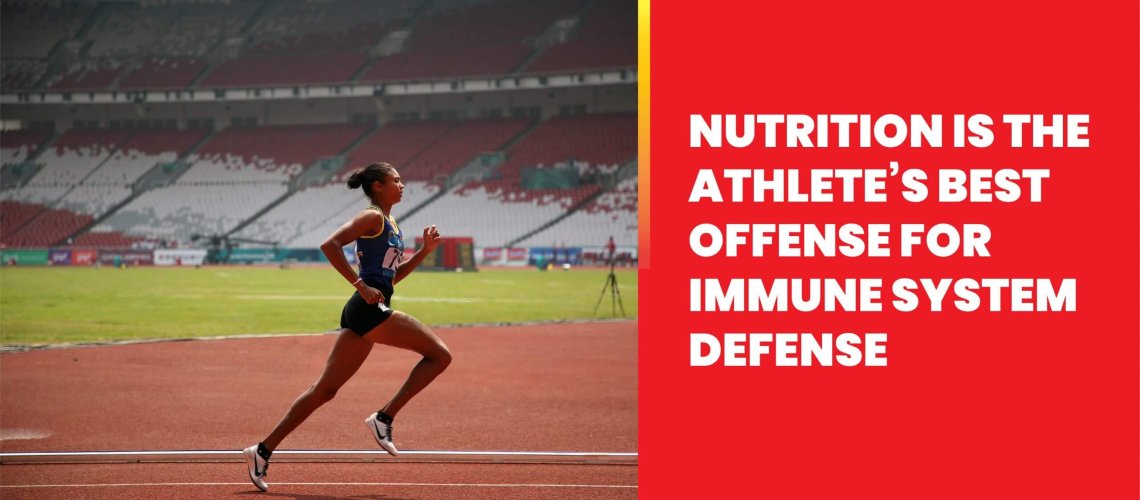Research shows that successful athletes get sick less frequently than their less-successful peers and, when they do get sick, are sick for shorter periods of time, causing less of a disruption to their training.(Walsh, 2019a) For that reason, nutritional strategies for preserving a healthy immune system should always be a priority for athletes. Immune defense can be best achieved by consuming adequate energy (calories) and protein along with adequate vitamins and minerals from a variety of food sources. It is also important to minimize immune system detractors such as excess alcohol which can alter the normal immune system response to infection, shortchange calorie and carbohydrate needs, and disrupt sleep.
One of the best ways for athletes to support the immune system is to consume enough carbohydrate to meet the demands of training and everyday living. For active individuals, this is important not only for performance, but also because exercising in a carbohydrate-depleted state may result in a greater fall in white blood cells, a critical part of the immune system. In addition, too little dietary carbohydrate may be a factor in blunting the immune response to infections as well as interfering with the normal inflammatory response. Adequate carbohydrate each day is essential to have a favorable effect on immune function, inflammation, and to keep stress hormones from rising too high.(Gleeson et al. 2004)
Consuming adequate amounts of carbohydrate is the also best way to ensure athletes ingest dietary fiber, prebiotics (non-digestible foods that promote the growth of healthy bacteria), and probiotics (the bacteria that live in the large intestine), all of which play a role in the health of the microbiome, a factor that appears important in maintaining healthy immune function.(Rooks and Garrett, 2016). Probiotic foods include:
- Asparagus
- Leeks
- Garlic
- Onion
- Wheat
- Banana
- Chicory
Probiotics (beneficial bacteria in the gut) may also protect the intestinal barrier and prevent the binding of pathogenic bacteria, effectively crowding out those deleterious bacteria. Probiotic foods include:
- Yogurt
- Kefir
- Sauerkraut (refrigerated)
- Pickles (refrigerated)
- Kimchi
- Tempeh
- Miso
The current strength of scientific evidence for the use of probiotics for immune support is moderate/strong.(Walsh, 2019b)
Vitamins and minerals also help to promote optimal immune health. These include :
| VITAMINS/MINERALS | FOOD SOURCES |
| Beta-carotene (Vitamin A) | Sweet potato, carrots, peppers, broccoli, butternut squash |
| Vitamin C | Citrus fruits, juices, potatoes, broccoli, strawberries, kiwi |
| Folic Acid | Green leafy vegetables, fortified breakfast cereals, liver, black-eyed peas, asparagus |
| Vitamin B6 | Chickpeas, tuna, salmon, potatoes |
| Vitamin B12 | Meat, fortified cereals, milk, eggs, fish, dairy and nutritional yeast |
| Niacin | Turkey, salmon, chicken, pork, brown rice, fortified cereal |
| Vitamin D | Salmon, trout, milk, fortified cereals, mushrooms, ER drink |
| Zinc | Oysters, beef, shellfish, pork, baked beans, fortified cereal, poultry, pumpkin seeds |
OMEGA-3 FATTY ACIDS
Emerging science suggests that omega-3 fatty acids may help to maintain the integrity of the intestinal barrier.(Constantini et al. 2017) The omega-3 fatty acids, EPA and DHA, both found in ENHANCED RECOVERY Sports Recovery Drink also confer anti-inflammatory benefits that can aid adaptations to training.(Calder, 2012) A serving of ENHANCED RECOVERYcontains 1600 mg of omega-3 fatty acids (EPA, DHA, and ALA) along with 25 grams of carbohydrate to help the body replace some of the carbohydrate used during exercise.
BOTTOM LINE
There are many dietary variables that are essential to immune function but the most important include:
- Adequate calories and protein.
- Quality carbohydrate, including dietary fiber.
- Dietary pre- and probiotics that can support immunity via their impact on the gut microbiome.
- Micronutrients including key vitamin and minerals.
- Vitamin D has a unique role as it is essential in the normal function of both the innate and the acquired immune systems.
- Omega-3 fatty acids can assist in blunting an aggressive inflammatory response.

Costantini L, et al. (2017) Impact of omega-3 fatty acids on the gut microbiota. Int J Mol Sci. 18:2645-2663.
Calder PC. (2013) Omega-3 polyunsaturated fatty acids and inflammatory processes: nutrition or pharmacology. Brit J Clin Pharm. 75 (3): 645-662.
Gleeson M, Nieman D, Peterson K. (2004) Exercise, nutrition and immune function. J Sports Sci. 22:115-125.
Rooks MG, Garrett WS. (2016) Gut microbiota, metabolites and host immunity. Nat Rev Immunol. 16(6);341-352
Walsh NP. (2019a) Nutrition and athlete immune health: a new perspective. Sports Sci Exchange. 29(198):1-7.
Walsh NP. (2019b) Nutrition and athlete immune health: new perspectives on an old paradigm. Sports Med. 49 (Suppl 2):S153–S168.
